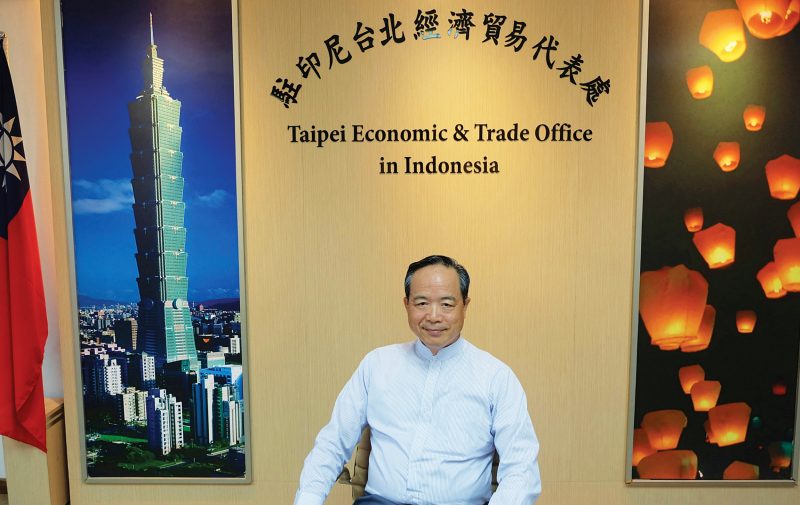Taiwan’s current president Tsai Ing-wen, during her inauguration address in May 2016, revealed her goals for identifying a new direction for economic development for her country. The New Southbound Policy aims to reinforce the sense of economic community with 18 specific countries: Australia, New Zealand, India, Sri Lanka, Pakistan, Bangladesh, Bhutan, Nepal, and the Association of Southeast Asian Nations (ASEAN) countries.
“The New Southbound Policy is mainly to strengthen the connection and to redefine our relations with the 18 partners targeted by this policy,” explains Representative John C. Chen, Head of Taipei Economic and Trade Office in Indonesia, who has been posted to Indonesia since December 2016. Mr. Chen hopes these new economic goals will allow for further benefits between countries. He adds that the policy has been perceived positively since its launch, particularly in Indonesia. It is intended to enable and establish better connectivity, shared resources, and to cultivate talented people within the specified countries.
There are four main aspects of the New Southbound Policy: economic and trade cooperation, talent exchanges, resource sharing, and regional connectivity. According to the Office of Trade Negotiations of the Executive Yuan, it aims to allocate NT$7.19 billion or roughly US$243 million for the policy’s implementation in 2018.
The Taiwanese government places importance on Indonesia for a number of reasons. Not only is Indonesia the leading member of ASEAN, the country also has a vibrant and young population. According to Indonesia’s Ministry of Development Planning, the country will experience a demographic surge in 2030-2040, with 64 percent of the population working from an estimated 297 million people. It has a growing middle class, with increased purchasing power within the domestic market.
The New Southbound Policy will centre primarily on people. “In the past, we mainly focused on economic and trade relations. We want the relations to be more comprehensive culturally,” states Mr. Chen. People-to-people relations, nongovernmental organizations, and youth exchanges will take a bigger part of the policy. In the meantime, the policy also promotes cooperation between Indonesia and Taiwan in the education, tourism, technology, healthcare, and agricultural sectors. There are five major flagship programmes that represent these fields: Regional Agriculture Development, Medical and Public Health Cooperation and the Development of Industrial Chains, Industrial Talent Development, Industrial Innovation and Cooperation, and New Southbound Policy Forum and Youth Exchange Platform.
Last year, the Taipei Economic and Trade Office in Indonesia facilitated diversified exchange programmes to boost people-to-people relations. For instance, it participated in the Bali International Film Festival that introduced eight Taiwanese films last September. In the same year, it also provided 69 scholarships for students from Indonesia to study in Taiwan. Taiwan wants to promote more cross-cultural activities in Indonesia. Taiwanese art exhibitions and dance performances have been held here in the past.
The New Southbound Policy was introduced to reduce its dependence on China. The head of Taipei Economic and Trade Office in Indonesia thinks the overall environment there is less conducive for foreign investors nowadays. “Firstly, its labour cost is getting higher and higher,” he says. “Much higher now than the time when Taiwanese investors first went to China.” He also cites that rules are constantly changing in China, and investors are considering other countries like Indonesia.
“The most important consideration is the complementarity,” Representative Chen tells Indonesia Expat. “We are running short on labour force. We need more trained skilled workers not only in Taiwan, but also working in Indonesia.” He highlights the opportunity for Indonesians to work in Taiwanese factories and companies. Currently, more than 250,000 Indonesian labourers are working in Taiwan. Despite those numbers, the Taiwanese government would also be interested in sharing its experience and expertise in areas such as science and technology.
Despite all of the positive spin on this policy, according to researcher Broto Wardoyo at the International Relations Department of the University of Indonesia, Taiwan’s relations with Southeast Asia are asymmetrical. Taiwan has made a great effort to push for relations with Southeast Asian countries. At the same time, these countries tend to be mostly passive in their response. Mr. Wardoyo argues that the lack of any diplomatic relations is still an obstacle; the One China Policy adopted by the countries in Southeast Asia is the biggest problem to any diplomatic effort. Economic developments could be used to create a de facto acceptance toward Taiwan.




